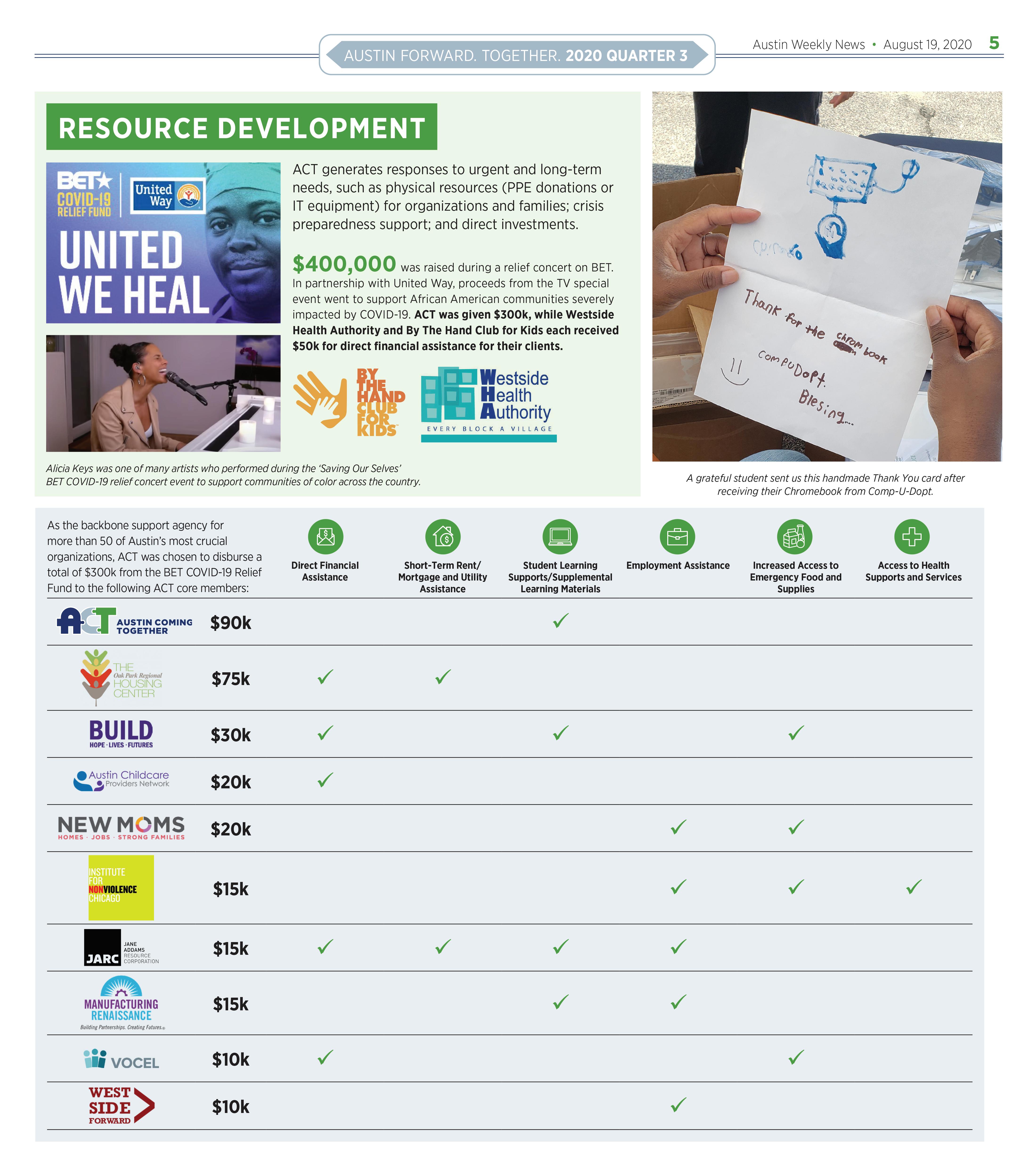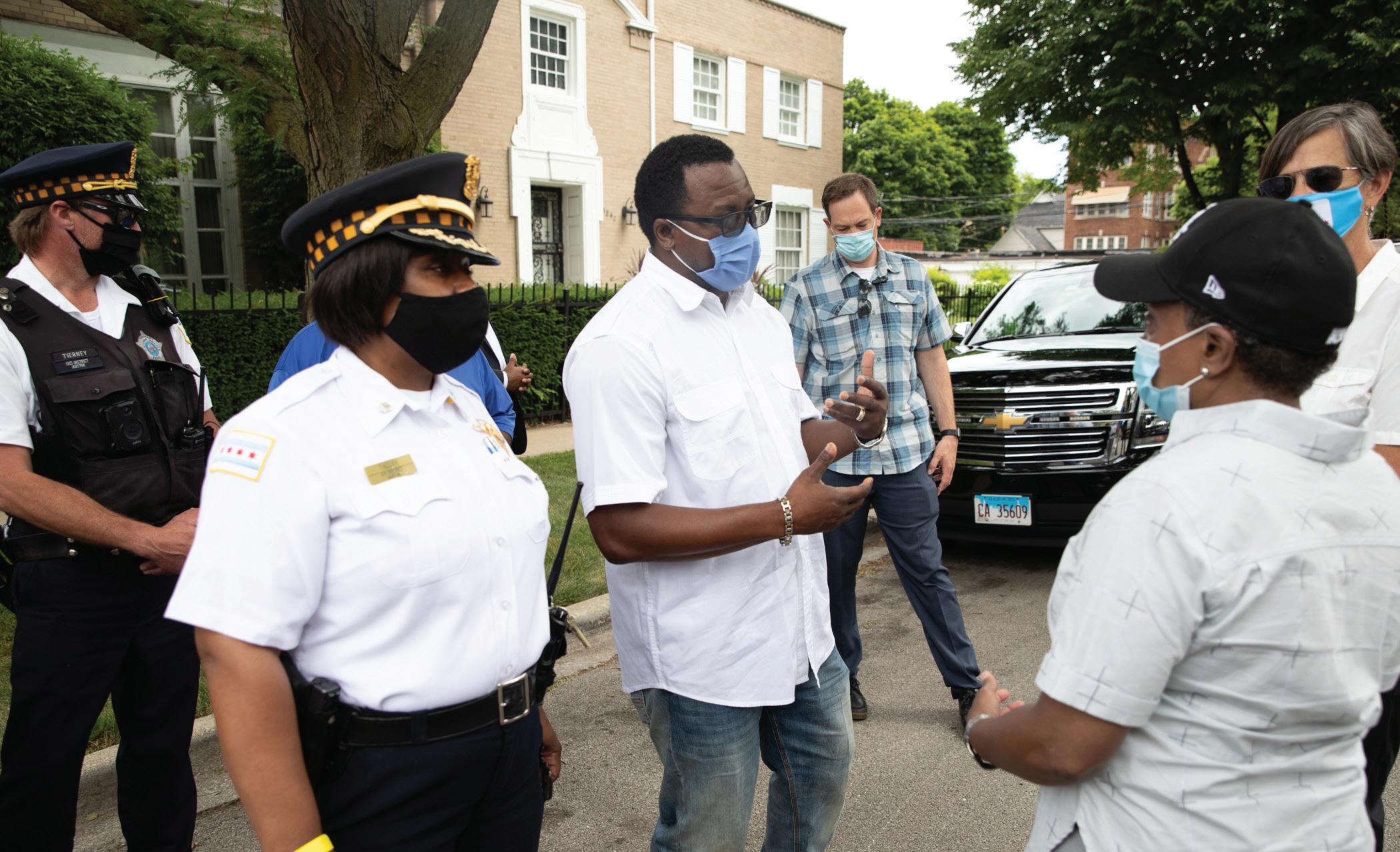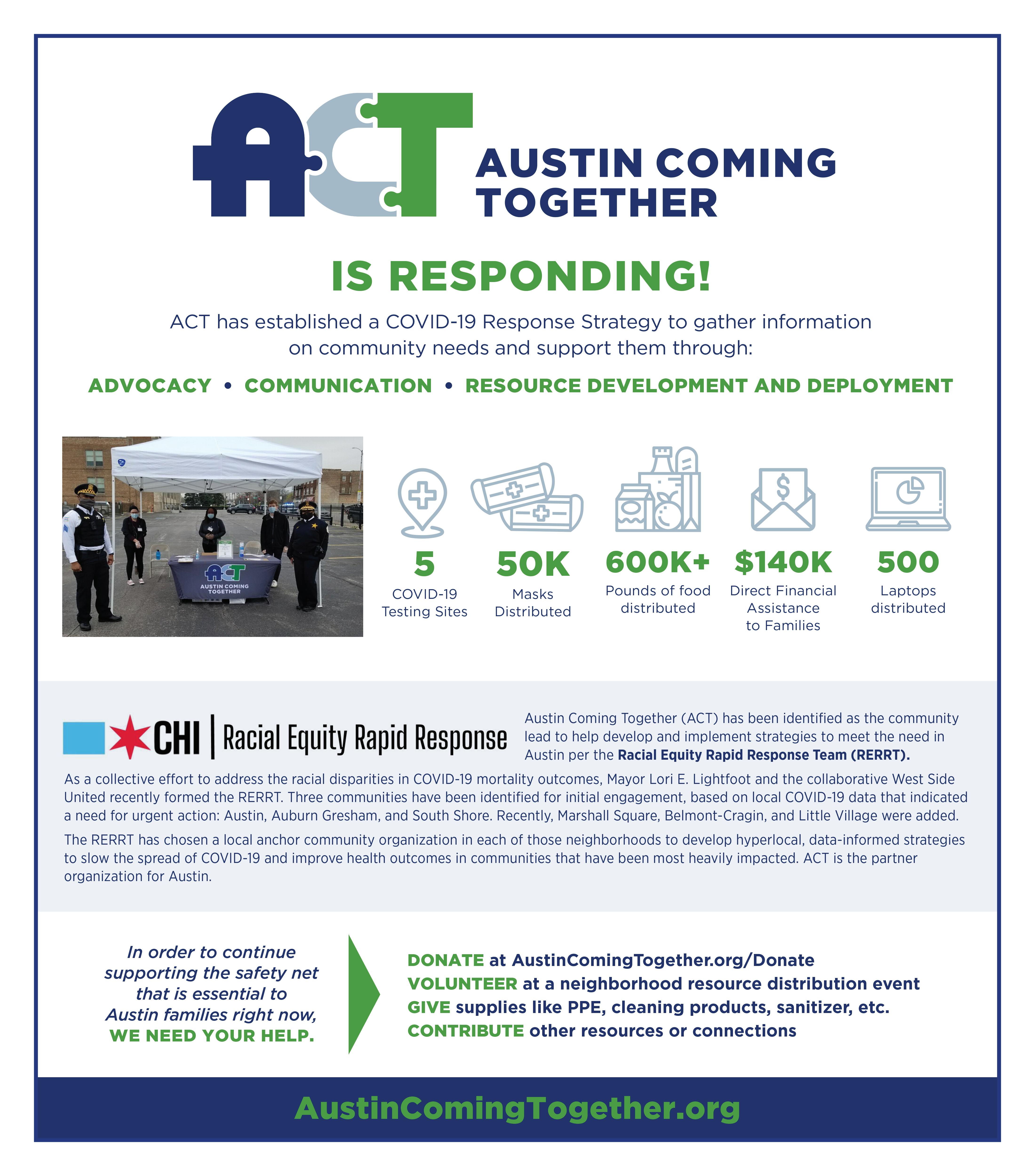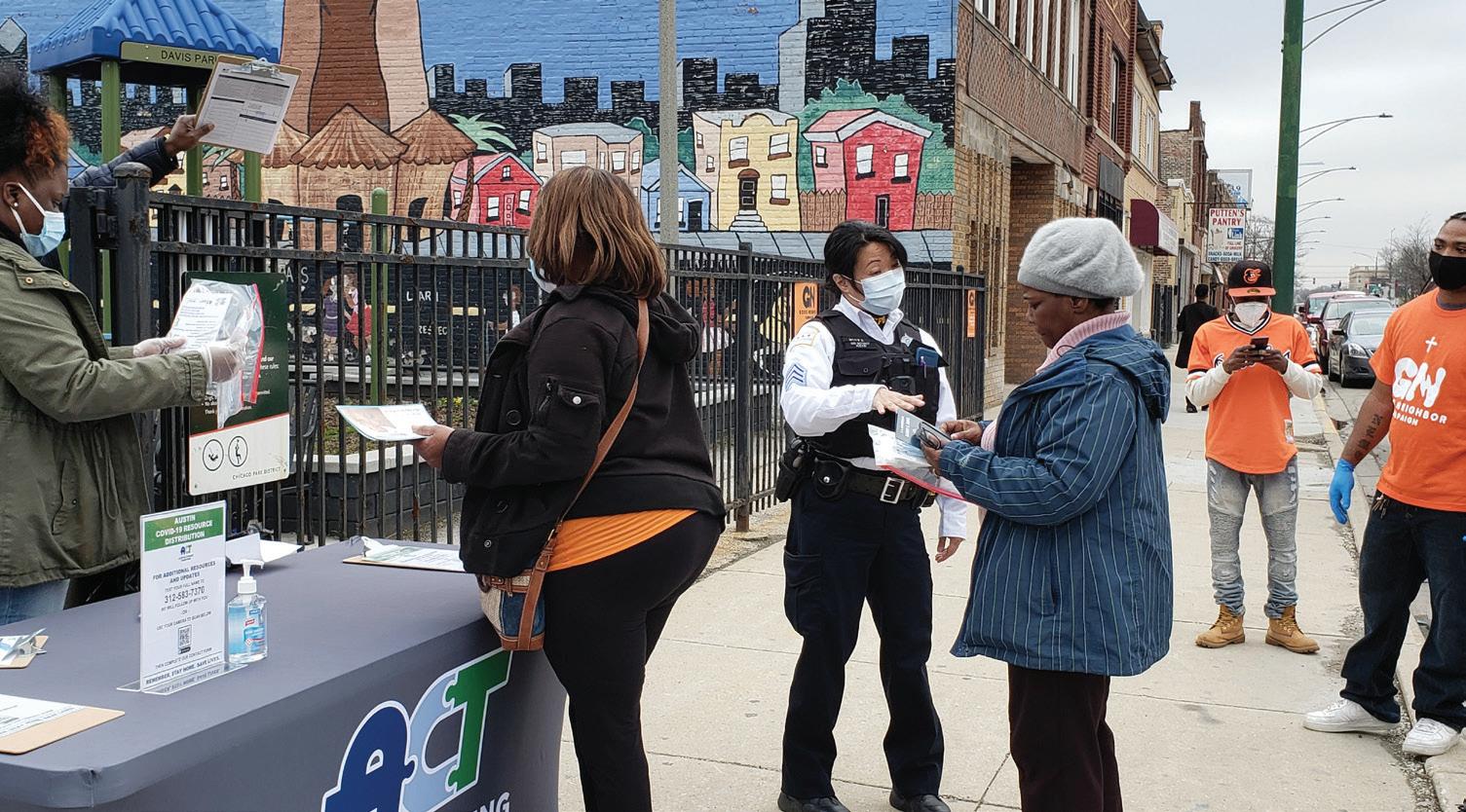
8 minute read
Resource Deployment
ACT COVID-19 Response Highlights
In order to ensure that the social services essential to Austin are able to survive, ACT has created a COVID-19 Response Strategy to support the community in four ways: Advocacy, Communication, Resource Development, and Resource Deployment. Here are a selection of updates on the progress we have made.
Up to 100 volunteers are needed to host each of the Pop-Up Food Pantry events in Austin.
ADVOCACY
ACT voices the needs of the key agencies that make up Austin’s support infrastructure, from education resources to social block clubs and nonprofits.
$550,000 was the total amount granted from the Chicago COVID-19 Response Fund directly to ACT member organizations to best serve Austin residents. Originally only expected to be $25,000, ACT’s advocacy in conversations with United Way of Metro Chicago and the City made the case for increased support for Austin.
$50k went to each of these members:
$25k went to each of these members: COMMUNICATION
ACT leverages all communication channels to disperse accurate, helpful information, and to provide updates on our progress in order to uphold ACT’s core value of transparency.
Hundreds of residents from in or nearby Chicago’s Austin neighborhood participated in a virtual town hall meeting on April 25, 2020. Experts shared up-to-date information about the impact of COVID-19 in our community, highlighted key resources, and discussed the best ways to protect yourself and your family. The RERRT supported ACT in hosting this event, which streamed live on ACT’s Facebook page.
ACT transformed their weekly Activities in Austin email to be solely about COVID-19 relief opportunities. The email lists resources for families, businesses, and nonprofits, as well as job openings, and ideas of ways to help.
Subscribe to ACT’s emails at AUSTINCOMINGTOGETHER.ORG
RESOURCE DEPLOYMENT
ACT creatively solves problems through collaboration with our partners to determine the best ways to get essential resources to Austin residents wherever they may be. ACT was able to
support families by connecting them to: 50K
Masks Distributed
600K+
Pounds of food distributed
500
Laptops Distributed
5COVID-19 Testing Sites
$140K in Direct Financial Assistance to Families

Plan Leaders
Community Narrative Economic Development
TASK FORCE COMMITTEE CHAIRS
Briana Shields Briana Janeé Arts Kenneth Varner Healthy Schools Campaign
STRATEGY LEADS
Lasondra Kern Community Resident Suzanne McBride Austin Talks Alicia Plomin Austin Coming Together Michael Romain Austin Weekly News Cindy Schneider Spaces-n-Places
TASK FORCE COMMITTEE CHAIRS
Jerrod Williams Community Resident & SANA Member Thomas Gary Community Resident
STRATEGY LEADS
Erica Staley Manufacturing Renaissance Heather Sattler Community Development Consultant Emily Peters Jane Addams Resource Corporation Melody Lewis Austin Chamber of Commerce Roxanne Charles West Side Forward
Education
TASK FORCE COMMITTEE CHAIRS
Natasha Smith-Walker Project Exploration Crystal Bell Ella Flagg Young Elementary School Charles Anderson Michele Clark High School
STRATEGY LEADS
Ruth Kimble Austin Childcare Providers’ Network Pam Price Chicago Public Schools Natasha Dunn VOCEL Cata Truss Community Resident Sean Schindl Kids First Chicago
Housing
TASK FORCE COMMITTEE CHAIRS
Athena Williams West Cook Homeownership Center Allison McGowan Community Resident
STRATEGY LEADS
Shirley Fields Hunters Realty Rosie Dawson Westside Health Authority Athena Williams West Cook Homeownership Center Chris Banks Community Resident
INTERESTED IN JOINING THE IMPLEMENTATION TASK FORCE?

Public Safety
TASK FORCE COMMITTEE CHAIRS
Bradly Johnson BUILD Inc. Marilyn Pitchford Heartland Alliance Chris Patterson Institute for Nonviolence Chicago
STRATEGY LEADS
Adam Alonso BUILD Inc. Bradly Johnson BUILD Inc. Edwina Hamilton BUILD Inc. Juan Villalobos BUILD Inc. Gina Young Catholic Charities Bertha Purnell Institute for Nonviolence Chicago Jordan Bester Westside Health Authority
Youth Empowerment
TASK FORCE COMMITTEE CHAIRS
Carmen Scott-Boria BUILD Inc. D’elegance Lane Westside Health Authority
STRATEGY LEADS
Deonna Hart BUILD Inc. Jeramie McGill St. Joseph Services Frederica Malone Catholic Charities
Civic Engagement
TASK FORCE COMMITTEE CHAIR
Deborah Williams Habilitative Systems Inc.
STRATEGY LEADS
Arnold Bearden South Austin Neighborhood Association (SANA) Sharif Walker CEO of Bethel New Life
Contact ACT’s Lead Organizer, Jose Abonce at 773.417.8615 or jabonce@austincomingtogether.org for more information.
A Racial Equity Focus
By Alicia Plomin The goals of the Racial Equity Rapid
Marketing & Development Manager, Response Team (RERRT): Austin Coming Together Flatten the COVID-19 mortality curve A fter reports in April showed the effects of COVID-19 were heightened in minority Chicago Build a groundwork for future work to address long standing and systemic inequities in Black and Brown communities, Mayor Lightfoot formed communities (health, economic, and a Racial Equity Rapid Response Team social) (RERRT). This collective effort aimed to address the racial disparities in the solutions,” said Ayesha Jaco, Executive COVID-19 mortality outcomes, while Director of West Side United. also looking at the underlying causes That is why the RERRT brought on a trusted behind why these communities are at the greatest risk. At first, the effort community organization as an anchor partner in each target area. Austin Coming Together (ACT) was identified as the lead to help focused on three communities where develop and implement strategies to meet cases were most prevalent: Austin, the need in Austin. With healthcare services Auburn Gresham, and South Shore. already limited, an early priority became “The key to the success of the Racial Equity Rapid Response Team is that multiple stakeholders, most especially long standing creating access to free COVID-19 testing. Through RERRT efforts, five mobile testing sites were established in Austin alone. community leaders, are sitting at the same Other RERRT goals include implementing table together, contact tracing, looking at the and increasing data, following distribution of PPE. community leaders’ insights to coThe key...is that multiple Through donations, as well as by working design solutions, and pulling together stakeholders, most especially with manufacturers to switch to producing city, philanthropic, and other resources long standing community masks, the RERRT was able to secure to take action,” leaders, are sitting at the thousands of said Sybil Madison, PPE supplies that Deputy Mayor of same table together...to take continues to be Education and Human Rights for action. distributed through localized efforts the City of Chicago. led by community West Side United, SYBIL MADISON, DEPUTY MAYOR, partners. a coalition of area EDUCATION AND HUMAN RIGHTS, CITY To combat the health institutions OF CHICAGO growing food whose goal is to insecurity, the RERRT address the death gap that exists between launched a series of pop-up food pantries. In Chicago’s West Side neighborhoods partnership with the Greater Chicago Food and downtown, was brought in as a coDepository, the RERRT worked with local convenor for the RERRT initiatives. They community-based organizations like ACT to quickly became an instrumental partner schedule distribution days where food boxes due to expertise in gathering data and of meat, produce, and dry goods have been understanding the area’s health factors. given to more than 9,000 households so far. The RERRT learned from and adopted several aspects of West Side United’s working model, one of them being the importance of community partnership. “When we see success is when we galvanize, empower, and arm community leaders as contributors to in Black and Brown communities in
CONCENTRATING ON CONNECTION
As education moved online, inconsistent or unavailable access to the internet caused already vulnerable students to fall even farther

Executive Director of Austin Coming Together Darnell Shields speaks with Mayor Lori E. Lightfoot at a community event hosted by the Adams and Austin Block Clubs in July 2020. Photo by Heidi Zeiger
behind. “We felt that digital inequities were going to deepen already wide achievement gaps if we didn’t act quickly,” said Daniel Anello, Chief Executive Officer at Kids First Chicago. Just months ago, Kids First Chicago released research that found Austin had the City’s largest connectivity gaps. Only one in three households here have internet access. Inspired by early conversations with ACT, Kids First Chicago established a sponsored internet services program for high-need communities and families. This concept led to Chicago Connected, a groundbreaking multi-year public-private partnership to close Chicago’s digital divide and ensure that Chicago Public Schools students have access to the internet and remote learning. It is the latest of its scale and longest in duration in the nation, with 100,000 students getting free internet access in Year One. ACT was selected as the primary lead agency in Austin for Chicago Connected. Additionally, A Better Chicago has also granted ACT funding to facilitate a similar effort that will help to cover families not eligible through CPS.
THE REAL PUBLIC HEALTH CRISIS
Since the RERRT began, COVID-19 deaths in the hardest hit areas like Austin are more than 20 times higher. Recently, deaths in the Latinx community have also increased, so the City added Marshall Square, Belmont-Cragin, and Little Village to the neighborhoods targeted by the RERRT. We now can see the reasons behind why COVID-19 has ravaged these neighborhoods. Policies rooted in structural racism do not allow Black and Brown communities to thrive. As David Ansell, MD, MPH, Senior Vice President for Community Health Equity at Rush University Medical Center summarized, “concentrated poverty is killing people.” According to an open letter to the Chicago community written by more than three dozen healthcare organizations that was released in June, systemic racism is a public health crisis. Collectively, the group of federally qualified health centers, safety-net hospitals and major academic medical centers care for more than 8 million patients across the Chicago area. As part of the RERRT, the group hopes to see bold steps to fulfill a shared responsibility to serve communities equitably.
BREAKING THE PATTERN
Partnerships like the ones we’ve described create a platform for a real connection between government and community to be formed. These connections are creating viable opportunities and a willingness to be proactive. But in order to break the patterns of disenfranchisement and make sure we build on lessons learned, we must translate our responsive solutions into a solid framework. And we must do it in collaboration with the community. n




